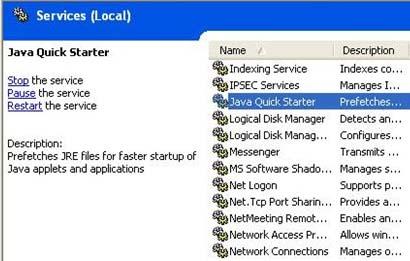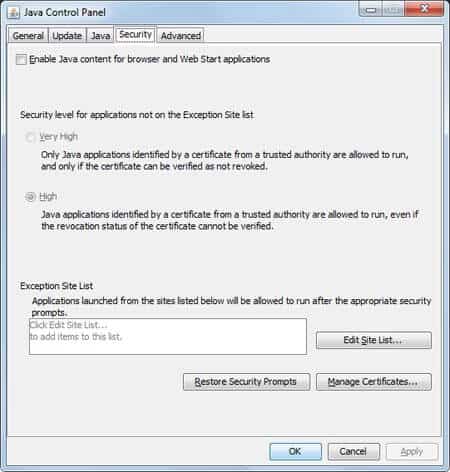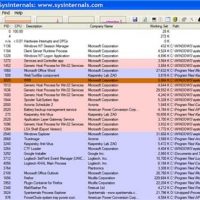When you open the Windows Task Manager and look at the Processes tab, you may notice that one of the running processes is called jqs.exe – but what is jqs.exe and do you need it?
What Is JQS.exe (Java Quick Starter)
It refers to the Java Quick Starter – a part of Oracle’s Java program. It was included in Java for many years (since version 6 update 10) – it was designed to improve the initial startup time for some Java applets and applications.
To achieve this, jqs.exe runs continually in the background which is why you may see it in Task Manager.
Note: jqs.exe is enabled by default in Windows XP but not on Vista and Windows 7/8/10. It was also only a part of Java 6 and 7 – the current Java version 8 no longer includes it.
Do You Need Java Quick Starter?
It typically uses only a couple of MB of memory (RAM) but the way it pre-fetches files in and out of memory inevitably has some impact on computer performance – and the disk input and output can become intensive over time.
This might be a reasonable way of spreading the load of starting Java – but only if you use Java at least once every session.
If you don’t use Java regularly/daily then all that pre-fetching of files (and jqs.exe itself) is a complete waste of your computer’s valuable resources – it may impact your computer’s performance every day for no benefit.
Also, I can’t say that I have ever actually noticed any increase in speed of Java applet startup that jqs.exe is supposed to assist with…
How Often Is Java Used?
According to research, a few years ago only 0.2% of all the websites in the world still used Java – web based games like Runescape was the most obvious survivor although most online games now use HTML5 or Adobe’s older Flash Player instead.
In my opinion, Java is only installed on many computers because people think they still need it – over 50% of our visitors have it installed but I’m sure that very few ever actually use it.
For this reason I suggest disabling jqs.exe unless you know that you use Java on a daily basis – Java works perfectly well without the Quick Starter program running.
How To Disable Jqs.exe
The easiest way to disable jqs.exe for all users of a computer is:
- Press the Windows and R keys at the same time to bring up the Run command (or click ‘Start’ and type ‘Run’ into the Search box)
- Type
services.mscand press OK to load the Services configuration window – this shows a list of installed services as shown below:

- Scroll down this list of services until you find ‘Java Quick Starter’ and then double click it to open the Java Quick Starter Properties window as shown below:

- In the General tab, change the ‘Startup type:’ from ‘Automatic’ to ‘Disabled’ then press the OK button
- Close the Services window – after you next restart your computer jqs.exe will be disabled and will no longer run.
You will be able to confirm jqs.exe is not running by looking in the Task Manager \ Processes tab.
Tip – You may see some websites recommending that you disable jqs.exe via Control Panel \ Java Control Panel \ Advanced Tab \ Settings \ Miscellaneous \ untick Java Quick Starter.
However this has several major disadvantages compared to the method shown above:
1. It doesn’t always work – many users report that jqs.exe comes back after restarting the computer.
2. It only applies to the currently logged in user, not all users of the computer.
3. The change is deleted the next time you update Java – so you would then have to repeat the process all over again…
For these reasons I always recommend disabling the Java Quick Starter Service as I outlined above – to make sure it works, and stays disabled.




I’ve been killing jqs.exe manually for months. Guess I shoulda done an internet search on it! Great info, thanks very much.
In the instructions on how to disable jqs.exe, or any other random executable that is deposited by a software download or update, you have stated: to use the “Run Command”, and then to type in “services.msc” etc., “In the General tab, change the ‘Startup type’ from ‘Automatic’ to ‘Disabled’ then press the OK button”; next, “Close the Services window – after you next restart your computer jqs.exe will be disabled and will no longer run”. I do not know if this is Windows XP specific, but I have found that it is easier, and faster, to hit “START>ADMINISTRATIVE TOOLS>SERVICES” to bring up the list of services, then open the properties dialog window of the service in question, and on the General Tab, stop the service first, then select disable from the “start-up type” drop down menu; and, as an added measure, select the “LOG ON” tab next, and disable it there as well, then hit “O.K.” The process is gone from Task Manager with no Re-Boot required, and without re-activation of the process later, as I have experienced in the past with other sneaky processes that publishers feel you must have running or else.
That’s a good option for XP Pro and is certainly quicker :-) I had to give the full route via services.msc though as many people won’t have Admin Tools in their Start menu – iirc it’s only on XP Pro and even then is optional depending how people have customized their menu.
Good point on stopping the service first, thanks for the feedback
Very helpful, well easy to follow.
A minute ago jqs was generating 2,000,000 page faults according to Task Manager.
Thanks
So (1) does all Quick Start software (i.e software with an icon on the task bar) create the same problem – i.e. unnecessary resource use? Ergo (2) does this mean that during software installs (not just Java) it is advisable to say no an option to include a QuckStart Icon.
While on this subject (3) what is the difference (in terms of resource use and purpose) between a Quick Start icon and an icon in the task tray? I tend to think that a task tray icon indicates that the relevant software is running but this is not always, it seems, the case. I have a few things that end up in the task tray during boot-up – Open Office, Java, QuickTime, Avast etc. Some of these have quick start icons too. Often double clicking a task tray icon has exactly the same effect as double clicking a task bar icon (although usually task tray icons have a larger right click menu I find). I see that with, for instance, Avast in the task tray it tends to mean ‘this software is running now’ but with Open Office on the other hand it seems to mean nothing in particular, unless, like Java it means that opening Open Office via the desktop, taskbar or through the Start menu, that OO will be up and running quicker than if the icon was not there.
I like to keep my task tray down to half a dozen icons at any one time if I can. Sometimes I see friends’ PCs with 20 or more icons in the task tray, generally because they just let software make all the decisions when installing it.
Actually, I must be thinking of a different version or setup of windows than my current one for some of the above. I just realised that Quick Start Icons are no longer on my TaskBar but on the start button menu popup. Other than that, everything else applies.
@Trev – anything in the system tray is a running process so takes up a certain amount of ram/cpu – quite a lot in Avast or other AV case, not very much at all in the case of jqs etc.
The Open Office entry will be their quickstarter process, not the full Open office program – you can disable it from loading at startup if you like.
Thank you so much ut if i disable JQS.exe will i face any trouble in any process next time when anyprocess requires it ? lease help
No, only Java uses it and even then it is not actually required – Java runs happily without it.
Unless you use Java every day the benefits of jqs.exe (to save a few milliseconds loading Java) are outweighed by having to load jqs every time Windows starts
I have XP and have disabled quick starter to save a bit of memory and processor time, would uninstall java but one of my games sites still uses it